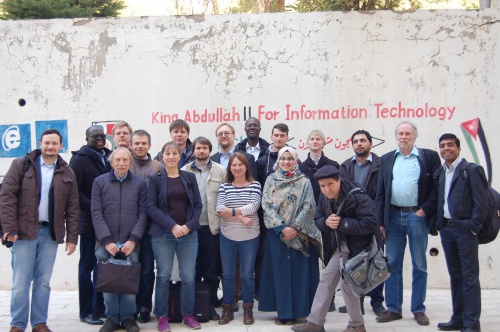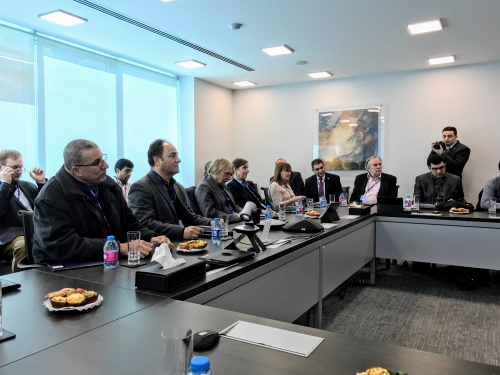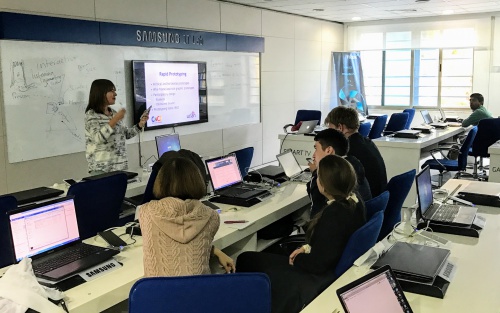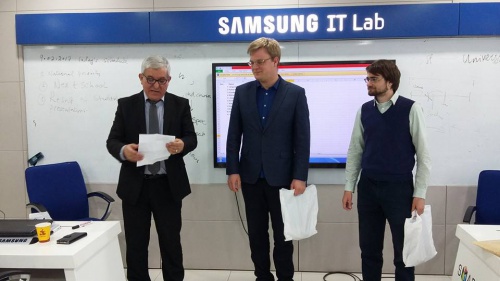Graduate Students and Faculty of EECS SUSU Took Part in the International School of Software Engineering in Jordan University
The Jordan University (Jordan) hosted the third International Workshop on Software Engineering in the framework of Erasmus+ PWs@PhD project from February 1-st to February 12-th 2017. The school was attended by graduate students and faculty from Russia, Jordan, United Kingdom, Finland, Denmark. School of Electrical Engineering and Computer Science of the South Ural State University were presented by four representatives, including two faculty members and two postgraduate students.

The delegation included the dean of the School of Electrical Engineering and Computer Science, Gleb Radchenko and the Assoc. professor of the system programming department Alina Latipova as well as two post-graduate students (Kirill Borodulin and Mikhail Timchenko).
Within the framework of the school, leading scientists from Jordan, Great Britain, and Canada provided lectures on such issues as software development, information security, requirements management, testing, service-oriented architecture, human-machine interface, and software metrics.
The participants of the school could see how those modern approaches were implemented in practice at ProgressSoft company – the leading IT company in Jordan. The heads of departments told about the organization of software development and support during the tour of the company’s office.

Graduate students presented reports on their research during the school. Graduate student Kirill Borodulin took 2nd place in the contest of papers on the topic: “Planning and dispatching computing resources in containerized cloud environments”. The jury noted the high level of his papers, indexed by Scopus as well as developed software.
For Mikhail Timchenko, another graduate student of the School of Electrical Engineering and Computer Science, it was a first experience of presenting his work at the international level. His work was awarded as a confident debut. Mikhail shared his impressions with us.
– Michael, what themes of the school do you remember most?
There were many directions at the school. Most of all I liked the lecture of Bashar Nuseibeh, professor of the British Open University. He talked about the current trends in the development of software requirements. There was not a single person in the audience who did not understand him, the presentation of the material was simple, and his English was excellent. Professor Nuseibeh was born in Jordan, he got his degree in the UK, where he decided to continue his scientific career.
On the last day of the school, we were given the opportunity to get acquainted with the education systems for post-graduate students in different countries. Local professors presented a modular structure for postgraduate education in the field of software engineering, which was accredited by the European Committee. During the seminar, the discussion arose about the advantages and drawbacks of each of the education systems.

– You prepared a presentation on your scientific work at this school. How do you like your presentation?
I am engaged in the subject of my scientific research for only six months, so there was not much practical results to present. This was my first report in English, and also it was the first by the topic of my scientific work. The reporting way of my Russian colleagues and me was strikingly different from foreign graduate students. We set out the steps of the forthcoming work and they presented an overview of the problematic issues. Each presentation was evaluated by at least three experts. It seems to me that my report was successful, although the language barrier partly prevented me from answering questions.
– Are you going to take a part in the following schools?
The international school will last several more years. I hope that I will be able to get into the number of its participants. I am grateful for the opportunity given and the experience gained.

The next school will be held at the South Ural State University in May 2017. It will be devoted to modern technologies of data analysis and mathematical fundamentals of software engineering.
